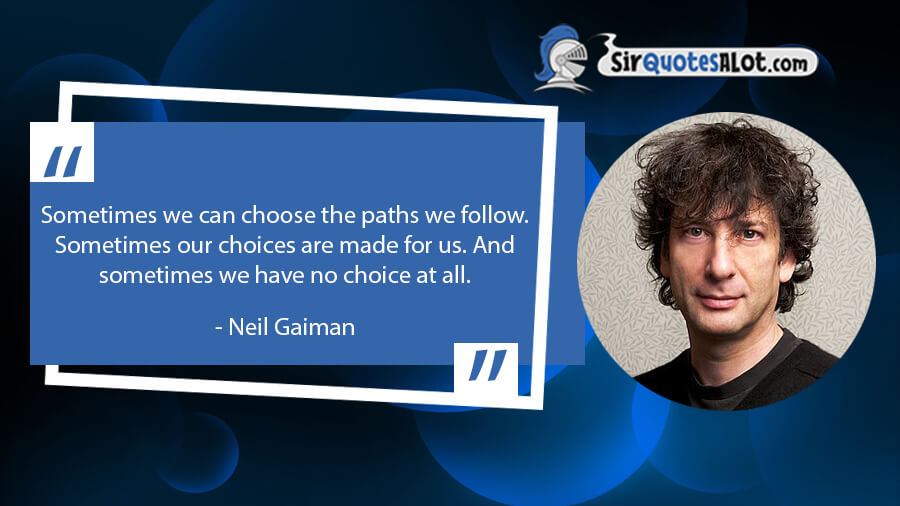Born on the 10th of November, 1960 in Portchester, Hampshire, England, Neil Gaiman is an author and novelist that focuses mostly in the genre of science fiction, fantasy, dark fantasy and horror. In this article, we will introduce you to the most amazing Neil Gaiman quotes, from personal interviews as well as from his books and creations.
He was influenced by many other writers, among them are J. R. R. Tolkien, Edgar Allen Poe, Mary Shelley, C. S. Lewis, Will Eisner, Harlan Ellison and others. According to Gaiman, the author who influenced him and his works the most is Roger Zelazny. This influence is seen in the style that Gaiman writes in and also the topics that he chooses to write about.
Neil Giaman is considered to be one of the best and most honoured authors and writers in his field and genre, winning hundreds of awards including the prestigious Hugo, Bram Stoker and Nebula Awards. He has also won the Carnegie and Newbery medals and is the first author that has won these medals for the same book or work, The Graveyard Book from 2008.
So now, it is time to share with you some of the best Neil Gaiman quotes on various topics. Enjoy!
Here is a sneak peek at the quotes in this article:
Neil Gaiman Quotes on Life
Life is a disease: sexually transmitted, and invariably fatal.
If you cannot be wise, pretend to be someone who is wise, and then just behave like they would.
That which is dreamed can never be lost, can never be undreamed.
Sometimes we can choose the paths we follow. Sometimes our choices are made for us. And sometimes we have no choice at all.
The one thing that you have that nobody else has is you. Your voice, your mind, your story, your vision. So write and draw and build and play and dance and live as only you can.
You grow up reading about pirates and cowboys and spacemen and stuff, and jus’ when you think the world’s full of amazing things, they tell you it’s really all dead whales and chopped-down forests and nuclear waste hanging about for millions of years.
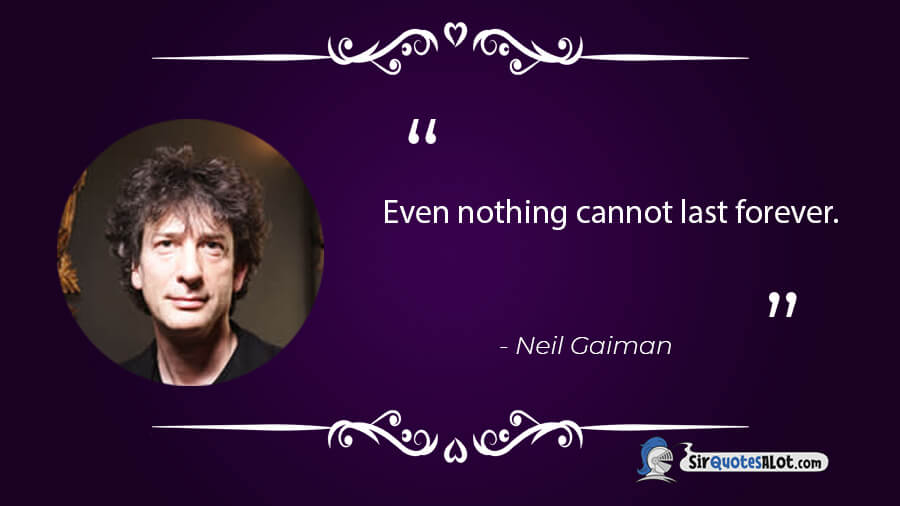
Even nothing cannot last forever.
It is sometimes a mistake to climb; it is always a mistake never even to make the attempt. If you do not climb, you will not fall. This is true. But is it that bad to fail, that hard to fall?
I must confess, I have always wondered what lay beyond life, my dear. Yeah, everybody wonders. And sooner or later everybody gets to find out.
Go and make interesting mistakes, make amazing mistakes, make glorious and fantastic mistakes. Break rules. Leave the world more interesting for your being here.
The world always seems brighter when you’ve just made something that wasn’t there before.
Why are we talking about this good and evil? They’re just names for sides. We know that.
I hope that in this year to come, you make mistakes. Because if you are making mistakes, then you are making new things, trying new things, learning, living, pushing yourself, changing yourself, changing your world. You’re doing things you’ve never done before, and more importantly, you’re doing something.
Everybody going to be dead one day, just give them time.
Life is sometimes hard. Things go wrong, in life and in love and in business and in friendship and in health and in all other ways that life can go wrong. And when things get tough, this is what you should do. Make good art.
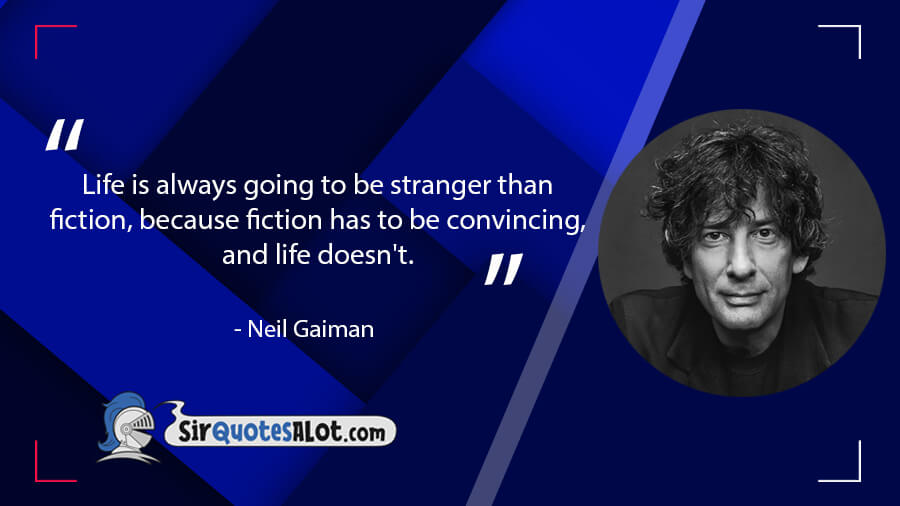
Life is always going to be stranger than fiction, because fiction has to be convincing, and life doesn’t.
The moment that you feel that just possibly you are walking down the street naked… that’s the moment you may be starting to get it right.
I lost some time once. It’s always in the last place you look for it.
You get ideas from daydreaming. You get ideas from being bored. You get ideas all the time. The only difference between writers and other people is we notice when we’re doing it.
I’ve never known anyone who was what he or she seemed; or at least, was only what he or she seemed. People carry worlds within them.
Empathy is a tool for building people into groups, for allowing us to function as more than self-obsessed individuals.
I don’t know if proud is the right word, but I am somebody who does not, on the whole, have the highest regard for my own stuff in that when I look all I get to see are the flaws.
You can take for granted that people know more or less what a street, a shop, a beach, a sky, an oak tree looks like. Tell them what makes this one different.
I’ve known ambitious people with no aptitude for the thing they did. Most of whom, rather terrifyingly, tended to succeed.
When I was a kid, we actually lived in a house that had been divided in two at one point, which meant that one room in our house opened up onto a brick wall. And I was convinced all I had to do was just open it the right way and it wouldn’t be a brick wall. So I’d sidle over to the door and I’d pull it open.
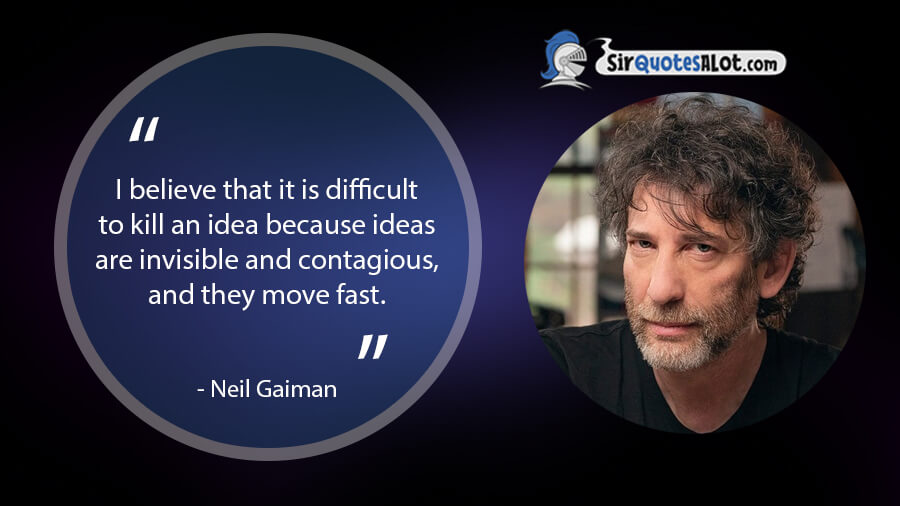
I believe that it is difficult to kill an idea because ideas are invisible and contagious, and they move fast.
Is the chemical aftertaste the reason why people eat hot dogs, or is it some kind of bonus?
I was the kind of kid whose parents would drop him off at the local town library on their way to work, and I’d go and work my way through the children’s area.
We all not only could know everything. We do. We just tell ourselves we don’t to make it all bearable.
The only people I ever get irritated with are the ones who announce, using my Twitter handle, that they are no longer following me and why.
Going off the grid is always good for me. It’s the way that I’ve started books and finished books and gotten myself out of deadline dooms and things.
It’s a given that we exist in a world where we have to live in continuity every day; no one is immune to that, in life or romance novels. By the same token, it’s not something I find terribly important.
I don’t think I’m mainstream. I think what I am is lots and lots of different cults. And when you get lots and lots of small groups who like you a lot, they add up to a big group without ever actually becoming mainstream.
Neil Gaiman Quotes on Writing
I suspect there are two kinds of novelists. Those who have a point of view and have something to say and then write a novel in order to say that thing, and those of us who write the book in order to find out what we think about that thing.
Things need not have happened to be true. Tales and adventures are the shadow truths that will endure when mere facts are dust and ashes and forgotten.
The imagination is a muscle. If it is not exercised, it atrophies.
As far as I’m concerned, the entire reason for becoming a writer is not having to get up in the morning.
I don’t know if any single book made me want to write. C.S. Lewis was the first writer to make me aware that somebody was writing the book I was reading – these wonderful parenthetical asides to the reader.
My guiltiest pleasure is Harry Stephen Keeler. He may have been the greatest bad writer America has ever produced. Or perhaps the worst great writer. I do not know. There are few faults you can accuse him of that he is not guilty of. But I love him.
It’s not a bad thing for a writer not to feel at home. Writers – we’re much more comfortable at parties standing in the corner watching everybody else having a good time than we are mingling.
Because, if one is writing novels today, concentrating on the beauty of the prose is right up there with concentrating on your semi-colons, for wasted effort.
I was a scholarship minor public school day boy at Ardingly College and later Whitgift School. Then, straight into work as a journalist – a wonderful thing for a writer.
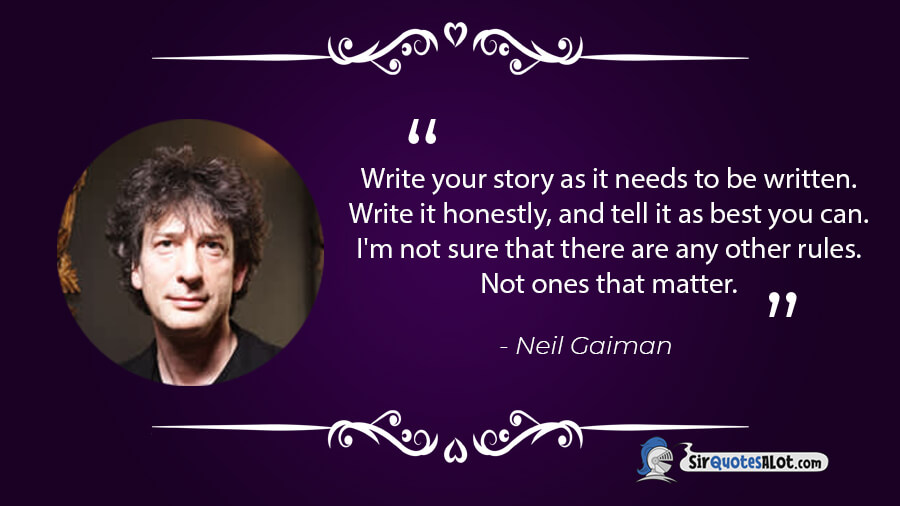
Write your story as it needs to be written. Write it honestly, and tell it as best you can. I’m not sure that there are any other rules. Not ones that matter.
I was always so relieved that anyone wants to publish anything I’ve written.
A good writer should be able to write comedic work that made you laugh, and scary stuff that made you scared, and fantasy or science fiction that imbued you with a sense of wonder, and mainstream journalism that gave you clear and concise information in a way that you wanted it.
I started blogging a decade ago because I like blogging. Writing’s a kind of lonely thing to do, and I liked the idea of demystifying the process because I loved it as a kid and teenager and as somebody who wanted desperately to write.
I’m never, I hope, stupid enough to believe that Twitter or blogging or any of this stuff is a substitute for actually doing the work or writing a book.
I wanted to write something that would be a comedy in the sense of making people feel happier when they finish it than they did when began it.
It’s a wonderful thing, as a writer, to be given parameters and walls and barriers.
Anything that keeps you happy and writing is part of my writing ritual: I like music, so I tend to have it playing in the background. But if I’m interested, I can write in an airport waiting areas.
I loved writing a book in which, in some ways, it’s very, very classical, and in some ways I’m breaking lots of rules about what you can do and what you can’t do.
I want to write a play. I’d like to do an original musical. I should probably put together a poetry collection.
I’m a fairly undisciplined writer.
I’ll agonize over sentences. Mostly because you’re trying to create specific effects with sentences, and because there are a number of different voices in the book.
I started writing when I was about 20, 21 maybe.
Rock and roll stars have it much better than writers when they’re on a tour.
I’m one of those writers who tends to be really good at making outlines and sticking to them. I’m very good at doing that, but I don’t like it. It sort of takes a lot of the fun out.
I started out writing much more science fictiony stuff and writing about science fiction.
Neil Gaiman Quotes on Reading
When I was young, I was reading anything and anything I could lay my hands on. I was a veracious-to-the-point-of-insane reader.
The simplest way to make sure that we raise literate children is to teach them to read, and to show them that reading is a pleasurable activity.
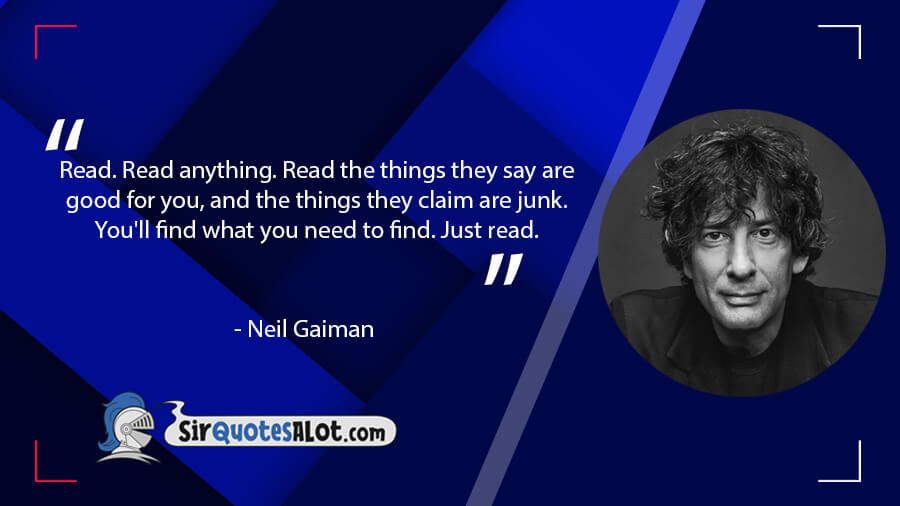
Read. Read anything. Read the things they say are good for you, and the things they claim are junk. You’ll find what you need to find. Just read.
As a kid, I would get my parents to drop me off at my local library on their way to work during the summer holidays, and I would walk home at night. For several years, I read the children’s library until I finished the children’s library. Then I moved into the adult library and slowly worked my way through them.
I was one those kids who had books on them. Before weddings, Bar Mitzvahs, funerals and anything else where you’re actually meant to not be reading, my family would frisk me and take the book away. If they didn’t find it by this point in the procedure, I would be sitting over in that corner completely unnoticed just reading my book.
I like reading. I prefer not reading on my computer, because that makes whatever I am reading feel like work. I do not mind reading on my iPad.
Reading is important. Books are important. Libraries are important. (Also, libraries are not child-care facilities, but sometimes feral children raise themselves among the stacks.
Neil Gaiman Quotes on Books and Stories
I lived in books more than I lived anywhere else.
Books were safer than other people anyway.
A town isn’t a town without a bookstore. It may call itself a town, but unless it’s got a bookstore, it knows it’s not foolin’ a soul.
I believe that stories are incredibly important, possibly in ways we don’t understand, in allowing us to make sense of our lives, in allowing us to escape our lives, in giving us empathy and in creating the world that we live in.
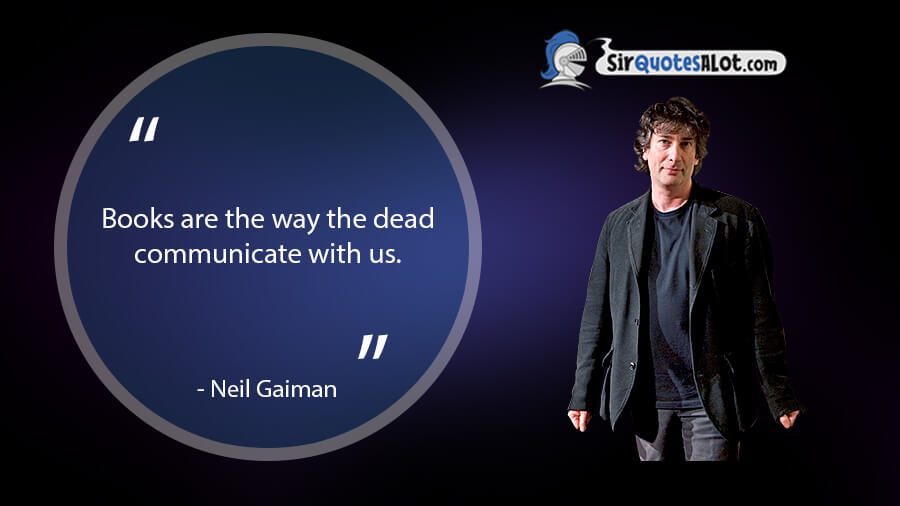
Books are the way the dead communicate with us.
Stories are like spiders, with all their long legs, and stories are like spiderwebs, which man gets himself all tangled up in but which look pretty when you see them under a leaf in the morning dew, and in the elegant way that they connect to one another, each to each.
Short stories are tiny windows into other worlds and other minds and other dreams. They are journeys you can make to the far side of the universe and still be back in time for dinner.
The only thing that kept me going was stories. Stories are hope. They take you out of yourself for a bit, and when you get dropped back in, you’re different, you’re stronger, you’ve see more, you’ve felt more. Stories are like spiritual currency.
When I was 7, my proudest possession would have been my bookshelf because I had alphabetized all of the books on my bookshelf.
In the case of ‘Ocean at the End of the Lane,’ it’s a book about helplessness. It’s a book about family, it’s a book about being 7 in a world of people who are bigger than you, and more dangerous, and stepping into territory that you don’t entirely understand.
I don’t think there is such a thing as a bad book for children.
My stuff gets published in some countries as fiction and in some countries as fantasy. It’s just where they think it will do best in the bookshops.
‘American Gods’ is about 200,000 words long, and I’m sure there are words that are simply in there because I like them. I know I couldn’t justify each and every one of them.
In many ways, it was much, much harder to get the first book contract. The hardest thing probably overall has been learning not to trust people, publicists and so forth, implicitly.
Great, big, serious novels always get awards. If it’s a battle between a great, big, serious novel and a funny novel, the funny novel is doomed.
Like some kind of particularly tenacious vampire the short story refuses to die, and seems at this point in time to be a wonderful length for our generation.
‘American Gods’ was designed to be, if not open-ended, at least a trilogy kind of shape, so there’s definitely one more book, probably another couple of books there to get written.
So I went out and bought myself a copy of the Writer and Artist Yearbook, bought lots of magazines and got on the phone and talked to editors about ideas for stories. Pretty soon I found myself hired to do interviews and articles and went off and did them.
I kept starting ‘Anansi Boys’ as a movie and stopping, and eventually wrote the novel and was happy.
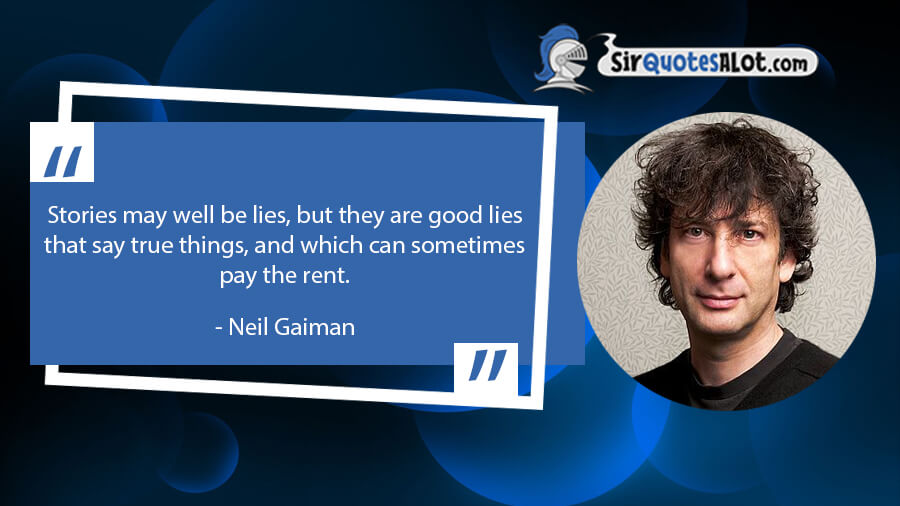
Stories may well be lies, but they are good lies that say true things, and which can sometimes pay the rent.
I went away in my head, into a book. That was where I went whenever real life was too hard or too inflexible.
Neil Gaiman Quotes on Love
Have you ever been in love? Horrible isn’t it? It makes you so vulnerable. It opens your chest and it opens up your heart and it means that someone can get inside you and mess you up.
In a perfect world, you could fuck people without giving them a piece of your heart. And every glittering kiss and every touch of flesh is another shard of heart you’ll never see again.
Love takes hostages.
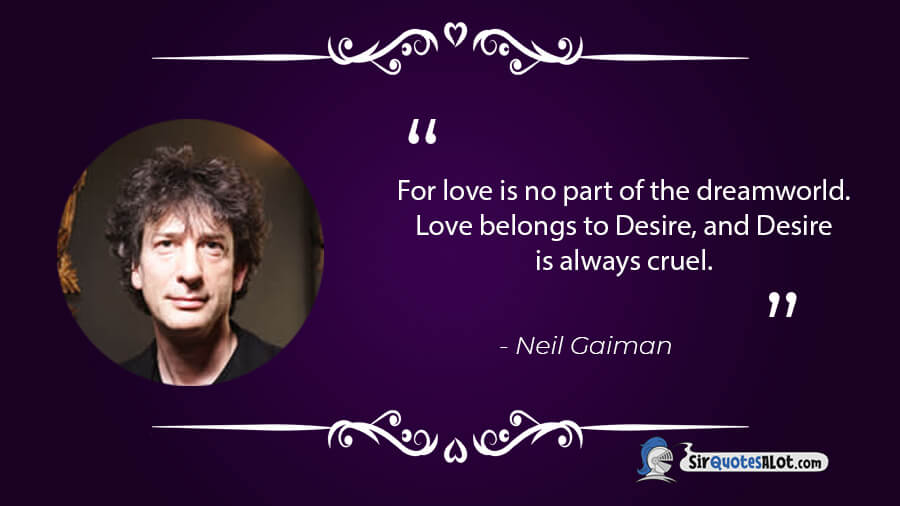
For love is no part of the dreamworld. Love belongs to Desire, and Desire is always cruel.
Every lover is, in his heart, a madman, and, in his head, a minstrel.
There are so many fragile things, after all. People break so easily, and so do dreams and hearts.
When we hold each other, in the darkness, it doesn’t make the darkness go away. The bad things are still out there. The nightmares still walking. When we hold each other we feel not safe, but better. ‘It’s all right’ we whisper, ‘I’m here, I love you.’ and we lie: ‘I’ll never leave you.’ For just a moment or two the darkness doesn’t seem so bad.
Then, one stupid person, no different from any other stupid person, wanders into your stupid life… You give them a piece of you. They don’t ask for it. They do something dumb one day like kiss you or smile at you, and then your life isn’t your own anymore.
Hearts may break, but hearts are the toughest of muscles, able to pump for a lifetime, seventy times a minute, and scarcely falter along the way. Even dreams, the most delicate and intangible of things, can prove remarkably difficult to kill.
Interesting Facts about Neil Gaiman
Can’t get enough of Neil Gaiman? Then here are some interesting facts about Neil Gaiman that you may not know about.
- He Loves to Cook – Okay, so it’s not a mind-blowing fact, but it’s still an interesting one. What Neil Gaiman loves to cook the most is crumble.
- He Was a Member in a Punk Band – Neil Gaiman was a member of the Ex-Execs which was a punk band. They were even offered a record deal which they declined, because according to Gaiman, it would screw them over.
- He Has Rat Figurines – Giaman has a total of five rat figurines which are a wizard rat, a demon rat, a vampire rat, a Neil rat and an angel rat. They were a gift from Lisa Snellings and they come in a limited edition.
- He Has a Talking Cat – Well, he’s not actually talking, not human words anyway, but according to Gaiman, the cat wanders around the attic and says words like “Hullo”, “MiMi” and so on. So, you decide if it counts as talking.
- He Thinks that Books Have Genders – Neil Gaiman says that books have genders, according to his belief anyway. These are genders that have to do with the gender of the man character of the stories. Stardust however, is a girls book according to Gaiman although it has a man hero.
- He Keeps Bees – He’s a bee keeper ever since the spring of 2007. Neil does attend to the hives when he has the time, but the official bee keeper is Sharin Stiteler.
- He Has Written His Own Comic – Neil Gaiman along with his friends have written their own comic back in 1976. They were 15 years old at the time and the comic was called Metro.
- He Has a Favorite Mythological Character – Manananggal is Neil Gaiman’s favorite mytological character. It’s an old mythical creature that comes from the Philippines and is able to separate from its lower part of body. Its fangs and wings give it a vampire-like appearance.
- A Novel of his Started as a Short Story – Neil Gaiman wrote “Ocean at the End of the Lane” for Amanda Palmer who is his wife and a musician. At the time, she was on tour, so he decided to write her a short story, which with time only got bigger, and bigger, and bigger, and this short story ended up to be a novel containing 56,000 words.
- He Has a Writing Shed – Gaiman has a gazebo that was built around the year 2000 where he used to go and write. He does this from time to time, leaves and comes back to write when he feels like it.
- He Wrote “Anansi Boys” with a 100-Year-Old-Pen – Wow! Neil Gaiman wrote “Anansi Boys” with a pen that is 100 years old. The pen was a Waterman Ideal Fountain 3.
- He Has an Unpublished Novel at his Attic – When he was 21 years old, Neil Gaiman wrote a novel which remains unpublished and can be found at his attic. According to Gaiman, only one of the pages in this novel sounds like him, and that’s the only page he’ll allow people to see.
- He’s Good Friends with Singer Tori Amos – They are so good friends that Neil Gaiman even wrote Amos into his Stardust novel as a talking tree. She has mentioned him in several of her songs, including “Space Dog”, “Carbon”, “Sweet Dreams”, “Horses” and “Tear in Your Hand”. Gaiman is also the godfather of Tori’s daughter, Tash.

